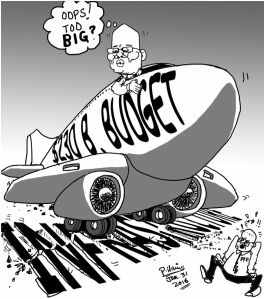|
The cartoons above appeared in local newspapers after the release of the 2016 Budget. (The cracked word in the left-hand one says "infrastructure".) The $230 billion budget will result in one of the largest deficits in recent years, even assuming that revenues grow an optimistic 7.2 percent. But while Guyana's political cartoonists have focused on this, Guyana's politicians largely have not.
Most of the political discourse over the budget, both in the parliamentary debates and in the media, has focused not on the budget being too large, but on whether or not the Budget is pro-poor. Some common criticisms include: 1. The current government is just doing everything the same as the last government, and there are no new policies or programs. 2. The new policies and programs are terrible. Criticisms 1 and 2 often both show up in the same speech. 3. Not enough money is being spent on supporting rice, sugar, tourism, or other industries. As for numbers 1 and 2, let's just say that no country has a monopoly on nonsensical political rhetoric. Number 3 is more economically interesting, especially since the budget is so large. It is true that spending is focusing on infrastructure, health and education, rather than industrial policy, and this is controversial. The government recently announced it will close one of its state-owned sugar estates, a decision that will put hundreds of people out of work. However, the state-run sugar industry produces sugar at almost twice the cost of the global sugar price, and the money that goes to propping up the sugar industry is money that can't be put towards programs in health, education, or other basic government services. It might be that criticizing the budget for not having something for everyone scores more political points than criticizing its size. But it would be nice to see more of a conversation about the trade offs inherent in spending more on government programs. Guyana is a country that is very cognizant of the environmental sustainability of its policies; it should strive to be cognizant of the economic sustainability of its policies too.
0 Comments
Leave a Reply. |
About Liz
I have worked in economic policy and research in Washington, D.C. and Ghana. My husband and I recently moved to Guyana, where I am working for the Ministry of Finance. I like riding motorcycle, outdoor sports, foreign currencies, capybaras, and having opinions. Archives
December 2016
Categories
All
|


 RSS Feed
RSS Feed
